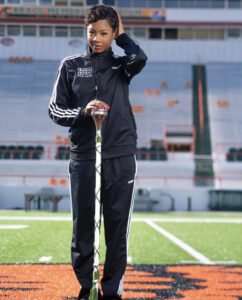
When you think of a member of the Florida A&M University’s Marching 100, do you picture a man or a woman? If you picture a man there may be a reason.
The music industry is male dominated. Statistics prove that men make up 60.4% of all music related occupations.
FAMU’s campus is not an exception seeing that 63.6% percent of music majors are men.
Despite the lack of recognition as leaders in the band, there was one woman who superseded the standard and proved she was capable. Cori Bostic became the first female drum major in the Marching 100’s 72-year history.
Bostic’s love of music and her goal to become a drum major was influenced heavily by her parents, both FAMU Marching 100 alumni, who she says taught her that she can reach any goal she strives for.
The path to becoming a drum major is not an easy one, let alone for a woman. Bostic said other women have tried and failed, but the support and mentoring of these women, and other women leaders in the band, were what inspired her to keep going.
“The people who tried out before me gave me the strength, wisdom and knowledge to be able to try out again, not give up, and come back even stronger,” Bostic said. “When those [young] girls are looking at me and saying I can do it, it’s because I’m looking at the women who came before me who tried to do the same thing and got so close and didn’t make it.”
Though it took several years for a woman to hold the highest title in FAMU’s band, Bostic says it is not because women were not thought worthy for the position.
Band is known for the family style bonds and close-knit community. Everyone is expected to be accountable and uplift each other to keep that “one band, one sound” atmosphere.
A changing demographic within the Marching 100 may have also contributed to the achievement and made these bonds that much stronger for Bostic.
Bostic noticed by her senior year, more and more women were joining the band, allowing for sister-like bonds and a sense of community for the growing number of women in this space. In her own experience, Bostic remembers distinguished female leaders that followed her and pushed her along her own journey.
Members like Gabrielle Farmer and Ariana Montgomery were key role models for Bostic, her high school section leader and drum major who also played for the Marching 100, were a crucial part of the skill and discipline she developed while at FAMU.
Playing alongside 12 other freshmen sisters at the time, Bostic believes the stereotype of men in band, and music, is nothing more than a common misconception that she was able to break apart.
“Being able to ascend to the leadership that I was in, I just felt like I was representing a population of the band that had always been there,” Bostic said.
At present, women make up a good portion of the band.
Wesleigh Jarrell, a senior psychology student from Royal Palm Beach, believes that the large number of female band members proves that the statistics are changing
“I think it’s so odd for people to think that a female, women or girl, couldn’t be a drum major. In high school it is such a familiar occurrence for there to be a girl drum major and on the collegiate level there are so many female musicians so why wouldn’t women on the collegiate level be just as capable?”
Bostic’s historic achievement was not only a win for Marching 100’s overlooked female population, but for other young women in the band who also aspire to be in important roles, such as section leader and drum major. Bostic says she is glad to serve as inspiration for these females and a reminder that they too can achieve the role of drum major if they wish.
If you picture a man when you think of a member of the Marching 100, look back at the field and think again. There is an entire group of women playing each game day in Bragg and these women are slowly taking over FAMU’s band.
Though Bostic thinks of her achievement as just another student triumph versus a milestone for women, she is forever a reminder that women are capable of — and are earning — titles and roles in every field.
Bostic’s high standard and the strong community between women in the band, and mentor relationships, will continue to allow other women to aspire for similar roles. It’s not so much a question as to if another woman will become drum major at FAMU, but when?